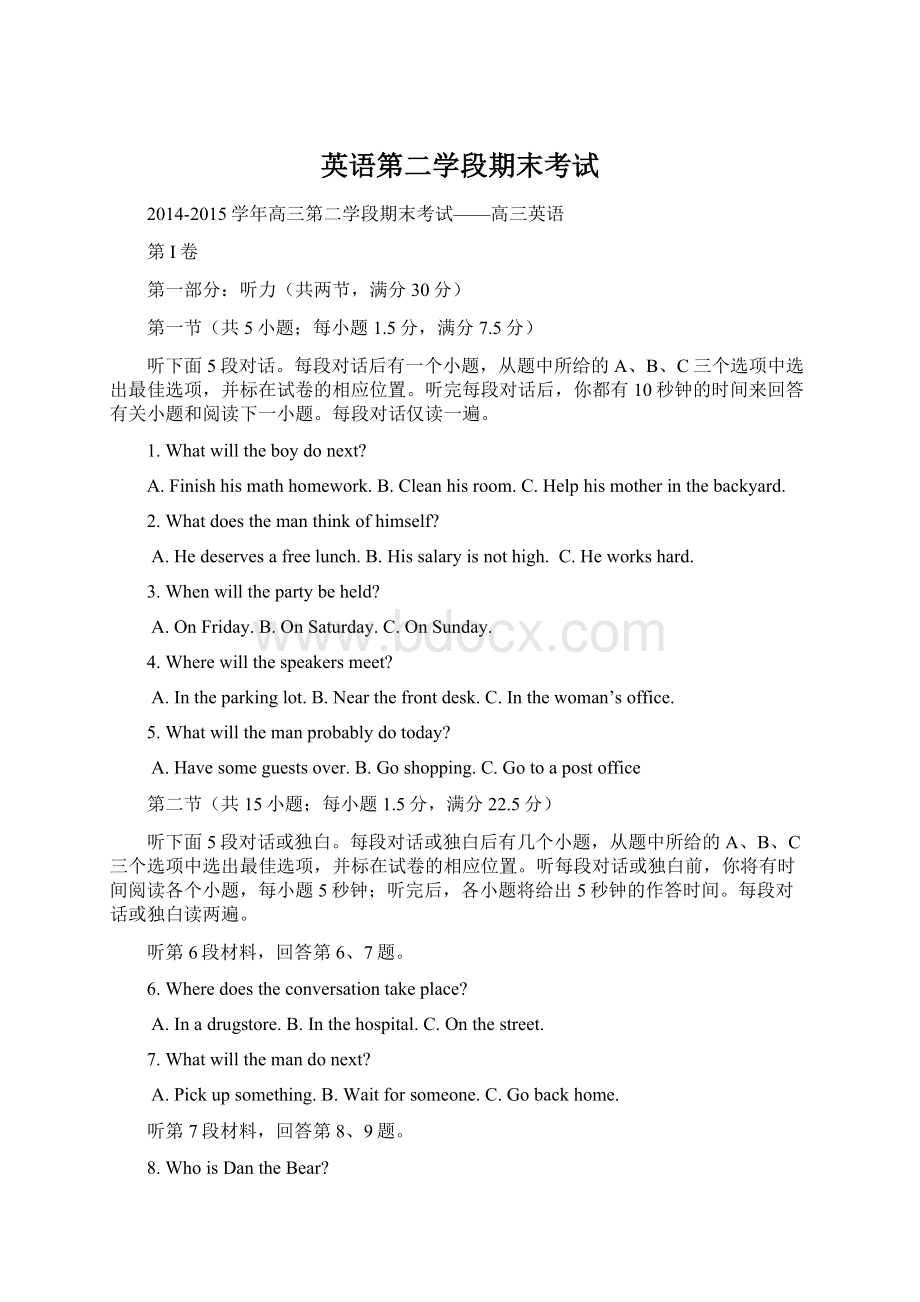英语第二学段期末考试.docx
《英语第二学段期末考试.docx》由会员分享,可在线阅读,更多相关《英语第二学段期末考试.docx(11页珍藏版)》请在冰豆网上搜索。

英语第二学段期末考试
2014-2015学年高三第二学段期末考试——高三英语
第I卷
第一部分:
听力(共两节,满分30分)
第一节(共5小题;每小题1.5分,满分7.5分)
听下面5段对话。
每段对话后有一个小题,从题中所给的A、B、C三个选项中选出最佳选项,并标在试卷的相应位置。
听完每段对话后,你都有10秒钟的时间来回答有关小题和阅读下一小题。
每段对话仅读一遍。
1.Whatwilltheboydonext?
A.Finishhismathhomework.B.Cleanhisroom.C.Helphismotherinthebackyard.
2.Whatdoesthemanthinkofhimself?
A.Hedeservesafreelunch.B.Hissalaryisnothigh.C.Heworkshard.
3.Whenwillthepartybeheld?
A.OnFriday.B.OnSaturday.C.OnSunday.
4.Wherewillthespeakersmeet?
A.Intheparkinglot.B.Nearthefrontdesk.C.Inthewoman’soffice.
5.Whatwillthemanprobablydotoday?
A.Havesomeguestsover.B.Goshopping.C.Gotoapostoffice
第二节(共15小题;每小题1.5分,满分22.5分)
听下面5段对话或独白。
每段对话或独白后有几个小题,从题中所给的A、B、C三个选项中选出最佳选项,并标在试卷的相应位置。
听每段对话或独白前,你将有时间阅读各个小题,每小题5秒钟;听完后,各小题将给出5秒钟的作答时间。
每段对话或独白读两遍。
听第6段材料,回答第6、7题。
6.Wheredoestheconversationtakeplace?
A.Inadrugstore.B.Inthehospital.C.Onthestreet.
7.Whatwillthemandonext?
A.Pickupsomething.B.Waitforsomeone.C.Gobackhome.
听第7段材料,回答第8、9题。
8.WhoisDantheBear?
A.Afisherman.B.Asinger.C.Adolphintrainer.
9.Whatwillthewomandobeforegoingtothebar?
A.Gotothebarber’s.B.Buysomeclothes.C.Performonstage.
听第8段材料,回答第10至12题。
10.Whoarethespeakers?
A.Students.B.Teachers.C.Clerks.
11.Howdidthewomanfeelaboutherweekend?
A.Itwasexciting.B.Itwassatisfying.C.Itwasboring.
12.WhatdidthemandoonSaturday?
A.Heplayedsports.B.Hevisitedsomeone.C.Hewatchedmovies.
听第9段材料,回答第13至16题。
13.Wherearethespeakers?
A.Inasupermarket.B.Intheman’shouse.C.Inthewoman’shouse.
14.Whatdidthewomanputonthecalendar?
A.Thepictureofthecommunity.B.Thescheduleofcommunityevents.C.Interestingstories.
15.Whatisthemanworriedabout?
A.Neighborhoodsafety.B.Shoppingconvenience.C.Schoolsinthecommunity.
16.Whywilltherebeaparty?
A.Tocelebrateafestival.B.Towelcomesomenewpeople.C.Tocelebrateabirthday.
听第10段材料,回答第17至20题。
17.WhatdoweknowaboutDeepSpringsCollege?
A.It’slocatedinacollegetown.B.Itslibraryisoftencrowdedwithstudents.C.Itsschoolbuildingsareancient.
18.Howmanybooksarethereinthelibrary?
A.70000.B.17000.C.9000.
19.WhatcanteachersattheCollegeexpect?
A.Highsalary.B.Peaceandquiet.C.Modernfacilities.
20.WhatcanstudentsatDeepSpringsdointheirsparetime?
A.Takeawalkinthemountains.B.Gotothecinema.C.WatchTV.
第二部分:
阅读理解(共两节,满分40分)
第一节(共15小题;每小题2分,满分30分)
阅读下列短文,从每题所给的四个选项(A,B,C和D)中,选出最佳选项,并在题卡上将该项涂黑。
A
MotherandIstartournewlifeinAmerica.Inthemorningwetraveltogethertowork.Risingatthecrackofdawn,Ilovetheadventureoftiptoeingaroundinthedarklivingroomwherewesleep,whisperingtoeachothersoasnottowakeAuntCeliaandUncleMartininthebedroom,thenleavingthehousesoundlesslyandmakingourwaytothesubwaystationinsemidarkness.BythetimewereachKingsHighway,therisingdaythrowsamysteriouslightontheemptyandquietavenueordinarilycrowdedwithhumantraffic,andontheshuttered(有百叶窗的)storefrontsandfruitstandsnowcozily(舒适的)wrappedinlayersofcanvas(帆布).Thereisasenseofmystery---asenseofpower---inbeingherebeforetherestoftheworldawakens…asifwitnessingthebeginningoftime.
Welovetravellingtogetheronthesubway,MotherandI.It’sfuntoobserveourfellowsubwayriders,exchangejokesinHungarian,playguessinggamesastotheiridentities,theirages,andtheirjobsandmakebetsastowherethey’dbegettingoff.
InacoupleofweeksMotherbecomesfamiliarwiththetrainroute,andshenolongerallowsmetoaccompanyher.
“ButI’llmissthefunoftravellingtogetherinthemorning,”Iprotest.
“SowillI.Butitcomesatasacrifice.Inordertoaccompanyme,youmustriseanhourearlier,losinganhour’ssleep.Youneedthatextrahourofsleep.”Motherisfirm,andIhavenochoicebuttocomplyandregretfullygiveuponourmorningfun.
“Ihopeyou’llhavetimetoteachmeEnglish.NowthatIhaveajobandtravelaloneonthesubway,I’llneedtoimprovemyvocabulary.Idon’twanttodependonyoueverytimeIneedtomakeaphonecallinEnglish,orwanttotakepublictransport.”
“Okay,madam,”Iagreeinahappy,jokingtone.“Howabouttoday?
Let’shaveourfirstlessonthisevening!
”
EveryeveningIaskMotheralotofquestionsaboutvocabularyandgrammar,andindeedinacoupleofweeksshelearnsenoughtodomarketingonherownandtravelfreelybysubway.
21.WhichdetailfromthetextshowsthattheauthorisexcitedaboutherlifeinAmerica?
A.Herresistancetothegrowingindependenceofhermother.
B.Heracceptanceofwhyshecannolongeraccompanyhermother.
C.Herdescriptionofrisingearlytoridethesubwaywithhermother.
D.Herdisciplinetoworkonlanguagelessonseverydaywithhermother
22.Whichofthefollowingdescribestheauthor’sattitudetowardshermother?
A.Supportive.B.Disrespectful.C.Sympathetic.D.Angry.
23.Thetextismostprobablytakenfrom___________.
A.areviewofabookB.abookaboutone’slifestory
C.atravelmagazineD.ahandbookforforeigners.
B
Welcometotheworldofmultitasking---aplacewherethemeasureofapersonishowmanyjobstheycanperformatthesametime.Infact,ifexpertsaretobebelievedmultitaskingisadisastrousidea.
Oneoftheopponents(反对者)ofmultitaskingisDr.CliffordNass,aprofessoratStanfordUniversity.“Peoplewhomultitaskfrequentlyarelessabletopayattention;theyareworseatmanagingtheirmemory,”hesaid.Inhisopinion,thelossthatwegetwithmultitaskingisharmlessinsomesituations,forexample,partofdoingbusinessinthedigitalworld;butyoucan’tdoseriousworklikewriting,thinkingorsolvinganimportantproblemthisway.Youdoworseevenasyouthinkyou’redoingbetter.Allthetimetheresearchpointstoasimplefact:
thebraincannotcope.Whenyoustopmidwaythroughcomposingareporttocheckanemail,youforceyourbraintostopandregroup.Itislikepressingthepausebuttonduringamovie,meaningthefilmtakeslongertowatch.
AndaccordingtoDr.Nass,theproblemsextendbeyondthebrain.Youngpeoplewhofrequentlymultitaskarenotassociallyandemotionallyhealthyasthosewhodon’t.Theyjustfeelmoreemotionallysatisfiedandthefeelingissogoodandtheyareboundtodesireitagain.ToddOppenheimer,awritersaid,“We’vebecomeaveryshort-termsocietyanddon’trewardpeoplefortakingalotoftimeonsomething.”Hefearswemayenduplosingthenextgenerationofgreatthinkers.“It’sreallyunfortunatebecausethelong-termchallengesofourworld---environmentalissues,financialissues---requirepeopletothinkwiselyaboutthelong-termconsequencesofwhattheydo.Andit’snocoincidencethatthekindofpeoplewhodothinklong-termdon’tmultitask.
24.AccordingtoDr.Nass,multitasking________.
A.contributestomemorizingvariousthingsB.mayresultinlosingthenextgenerationofgreatthinkers
C.canbeperformedusingdigitaltoolsD.makestheperformanceemotionallyaffectedonly
25.Fromthepassage,wecantell________.
A.wemistakenlybelievethatwe’redoingbetterbyswitchingbetweentasks
B.multitaskingdoesharmtousineveryarea
C.foreverytaskyouaddtoyourmultitasking,youcanfinishyourgoalmorequickly
D.thelossthatwegetwithmultitaskingisharmless
26.Whichofthefollowingisamultitaskingaddict?
A.YouwatchfromstarttofinishwithoutdistractionwhenplayingaDVD.
B.Youhaveyourofficedeskcoveredwithpaperworkfromvariousunfinishedprojects.
C.Youfeelthatwhenyoutrytodotoomuchatonce,theresultalwayssuffers.
D.Youturnyourcellphonetosilencewhenyouareouttodinewithfriends.
27.Theauthormainlywantstotellus_________.
A.itismoreefficienttodothingsallinamixedwayB.ittakeslongerforustobecomeagreatthinker
C.weshouldn’tbelazyifwewanttoaccomplishmanytasksD.thelessyouswitch,thebetteryoudo
C
Here’sanewwarningfromhealthexperts:
Sittingisdeadly.
Scientistsareincreasinglywarningthatsittingforprolongedperiods—evenifyoualsoexerciseregularly—couldbebadforyourhealth.Anditdoesn’tmatterwherethesittingtakesplace—attheoffice,atschool,inthecarorbeforeacomputerorTV—justtheoverallnumberofhoursitoccurs.Severalstudiessuggestpeoplewhospendmostoftheirdayssittingaremorelikelytobefat,haveaheartattackorevendie.
InaneditorialpublishedthisweekintheBritishJournalofSportsMedicine,ElinEkblom-BakoftheSwedishSchoolofSportandHealthSciencessuggestedthatauthoritiesrethinkhowtheydefinephysicalactivitytohighlightthedangersofsitting.
Whilehealthofficialshaveissuedguidelinesrecommendingminimum(最少的)amountsofphysicalactivity,theyhaven’tsuggestedpeopletrytolimithowmuchtimetheyspendinaseatedposition.
“Afterfourhoursofsitting,thebodystartstosendharmfulsignals,”Ekblom-Baksaid.Sheexplainedthatgenesregulating(调节)theamountofglucose(葡萄糖)andfatinthebodystarttoshutdown.
Evenforpeoplewhoexercise,spendinglongperiodsoftimesittingatadeskisstillharmful.TimArmstrong,aphysicalactivityexpertattheWorldHealthOrganization,saidpeoplewhoexerciseeveryday—butstillspendalotoftimesitting—mightgetmorebenefitifthatexercisewerespreadacrosstheday,ratherthaninasinglebout(一回).
Still,inastudypublishedlastyearthattrackedmorethan17,000Canadiansforaboutadozenyears,researchersfoundpeoplewhosatmorehadahigher